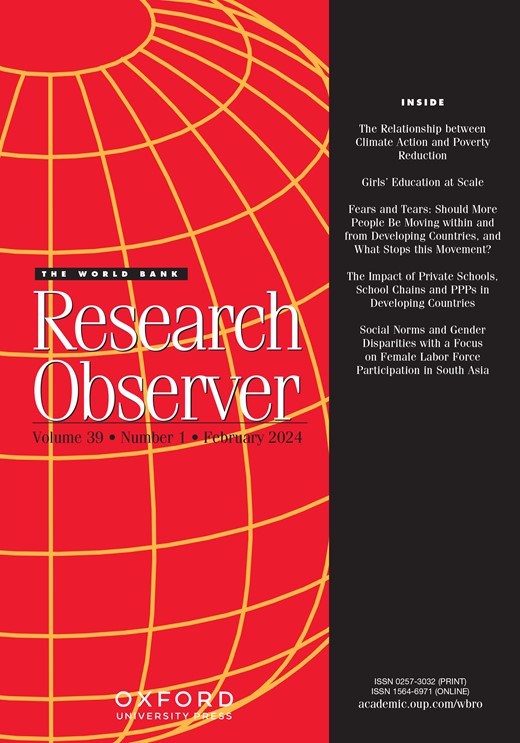Can civil society overcome government failure in Africa
IF 3.3
1区 经济学
Q1 DEVELOPMENT STUDIES
引用次数: 27
Abstract
Government failures are widespread in Africa. Symptoms include absentee teachers, leakage of public funds, monopolized trucking, and employment-restricting regulations. Can civil society do anything about these failures? Will external donor support to civil society help? The authors argue that the challenge for civil society is to improve government functioning by strengthening political incentives - the underlying cause of government failure - rather than bypassing or supplanting the state. This paper reviews the available evidence on civil society interventions from this perspective. Although the current increase in political competition and extensive citizen engagement in Africa seems to create the potential for civil society influence, the authors find that there are large knowledge gaps regarding what works, where, and how. Some rigorous evaluations find significant impacts of civil society involvement on development outcomes, but these studies typically pay insufficient attention to the mechanisms. For example, are impacts due to overcoming government failure or to changing private household behavior, leaving the wasteful allocation of public resources untouched? The authors conclude that donor support to civil society should take an approach of learning by doing through ongoing experimentation backed by rigorous, data-based evaluations of the mechanisms of impact.非洲的公民社会能否克服政府的失败
政府失灵在非洲很普遍。教师缺勤、公共资金外泄、垄断运输、限制雇佣等都是典型的症状。对于这些失败,公民社会能做些什么吗?外部捐助者对公民社会的支持会有帮助吗?作者认为,公民社会面临的挑战是通过加强政治激励——政府失灵的根本原因——而不是绕过或取代国家来改善政府的运作。本文从这一角度回顾了民间社会干预的现有证据。尽管目前非洲政治竞争的增加和广泛的公民参与似乎创造了公民社会影响的潜力,但作者发现,关于什么有效、在哪里有效以及如何有效,存在着巨大的知识差距。一些严格的评估发现民间社会的参与对发展成果有重大影响,但这些研究通常对机制关注不足。例如,这些影响是由于克服政府失灵还是由于改变私人家庭行为,而不影响公共资源的浪费配置?作者的结论是,捐助者对公民社会的支持应该采取一种边做边学的方法,通过对影响机制进行严格的、基于数据的评估来支持正在进行的实验。
本文章由计算机程序翻译,如有差异,请以英文原文为准。
求助全文
约1分钟内获得全文
求助全文
来源期刊

World Bank Research Observer
Multiple-
CiteScore
12.60
自引率
1.20%
发文量
8
期刊介绍:
The World Bank Journals, including the Research Observer, boast the largest circulation among economics titles. The Research Observer is distributed freely to over 9,100 subscribers in non-OECD countries. Geared towards informing nonspecialist readers about research within and outside the Bank, it covers areas of economics relevant for development policy. Intended for policymakers, project officers, journalists, and educators, its surveys and overviews require only minimal background in economic analysis. Articles are not sent to referees but are assessed and approved by the Editorial Board, including distinguished economists from outside the Bank. The Observer has around 1,500 subscribers in OECD countries and nearly 10,000 subscribers in developing countries.
 求助内容:
求助内容: 应助结果提醒方式:
应助结果提醒方式:


